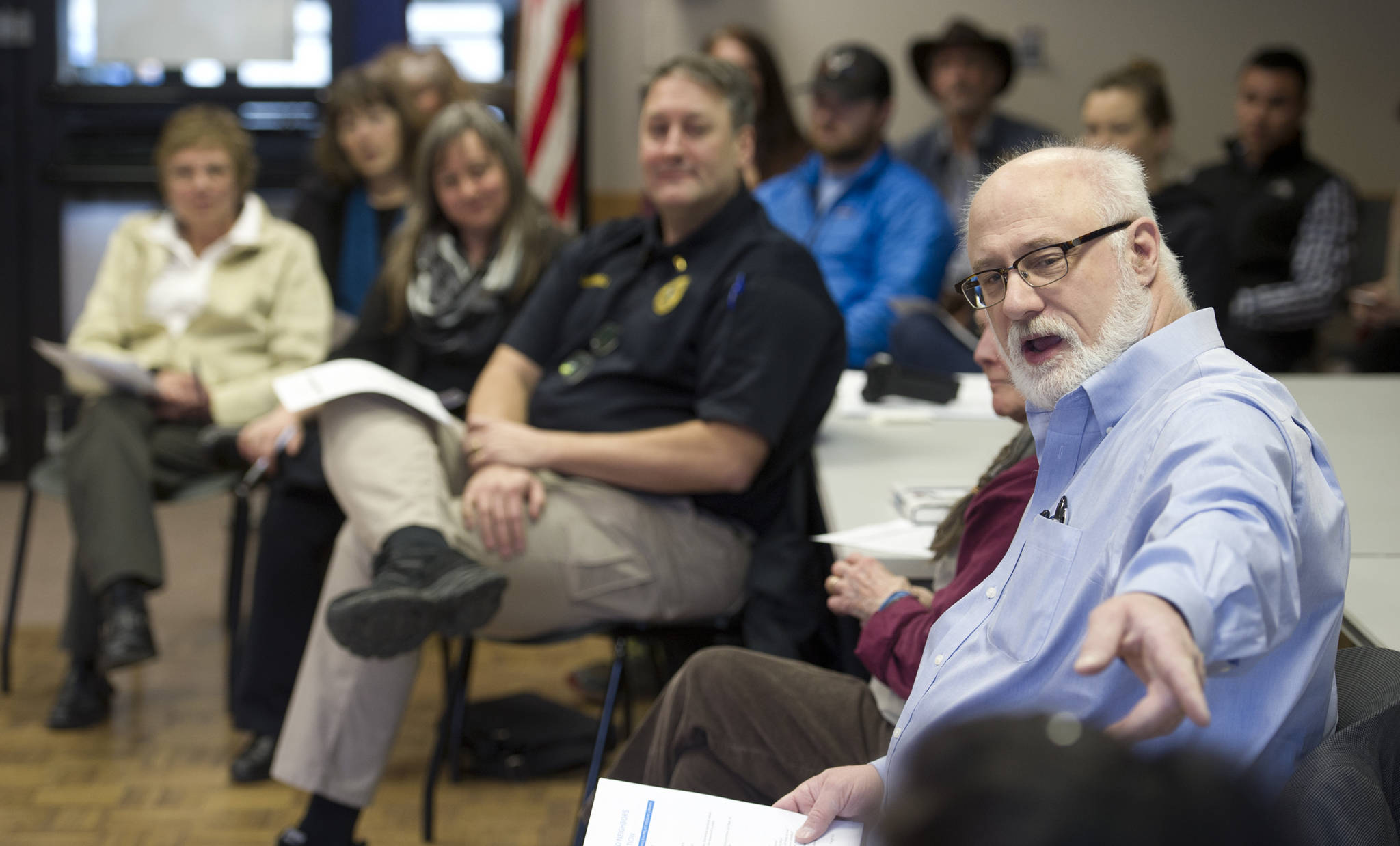A Tuesday night meeting of the Douglas Island Neighbors Association cleared up many of the misconceptions surrounding a new Department of Corrections pre-trial program, but there are still many decisions to be made.
State Director of Pretrial Services Geri Fox spoke to a gathered group of more than 30 people about the basics of the program and talked as much about what it won’t be as what it will.
Some of the first words she spoke addressed a rumor.
“We are not housing offenders on Douglas Island,” Fox said, pausing briefly for emphasis between each word. “When I hear the term ‘facility,’ it causes me angst. ‘Pre-trial facility,’ I think it implies maybe housing. (It was) not ever a conversation whatsoever.”
What the program is — or what it will be when it begins in January 2018, she said — is a group of officers who work with individuals who have been accused, but not yet convicted or acquitted of that crime. The only facility that will come to Juneau is an office building for these officers, she said.
There has been no decision yet as to where these offices will be, but Fox reiterated that it will not be on Douglas Island, saying that the DOC heard the town of Douglas’ concerns when it was evaluating where to put the facility and has decided to look elsewhere. There has not been a decision made about what exactly the setup of the facility will be, and whether it will include housing for the officers on staff or not. They have also yet to hire the officers, and will likely do so before September, Fox said.
These officers serve a similar role as parole officers, supervising those who are awaiting trial. Prior to this initiative — which is part of Senate Bill 91 in the effort to reduce the number of incarcerated individuals in the state — those accused of a crime were offered bail or were released on their own recognizance.
This, as Fox said at the meeting, was not an effective way to monitor defendants. This new program will have officers visit individuals in their homes, or in some cases meet with them briefly at the pre-trial facility. With higher-risk defendants, the program will employ electronic monitoring, including ankle bracelets that monitor a person’s location and in some cases that will monitor their alcohol intake.
This pre-trial program will not ship in defendants from other areas, but will only deal with those in Juneau who are awaiting trial. The program will not only provide a good way to keep track of those awaiting trial, Fox said, but will also give the defendants a chance to maintain some normalcy.
“We’ll let you go out, we’ll let you continue your life, we’ll let you keep your job, keep your apartment,” Fox said of the defendants. “Those are all good things, and they help you, right, if you aren’t going to be a criminal (in the future). It helps you keep those things in place. We want those things to stay in place.”
Whenever a person is arrested in Alaska — and there are around 32,000 arrests in the state per year, Fox said — that person will go through an evaluation process that figures out the best option for the person, whether it’s being incarcerated or whether it’s being put in the pre-trial program. The specifics of this process will be sorted out by May, Fox said.
One important factor of this evaluation, relating to the pre-trial process, is the likelihood of a defendant committing a criminal offense between the time the person gets arrested until the person’s case is heard in court. Another important factor is the likelihood of a defendant missing his or her court date. If a person is a repeat offender, he or she will have a lower chance of being included in the pre-trial program.
[Rumors fly about to house defendants]
Those at the meeting, many of them Douglas residents, had numerous queries for Fox. She answered questions for nearly 40 minutes. After Fox’s answers to those questions, multiple people on hand expressed that they now understood the merits of the program.
Douglas Island Neighbors Association (DINA) president Robert Sewell said after the meeting that he believes the conversation was “frank and business-like,” and that the pre-trial concept as a whole is a good one. He still remains concerned about whether a pre-trial program would truly increase a community’s safety. Sewell said he’d like to have DINA be a part of the planning process.
Meanwhile, Douglas resident Fred Hiltner chimed in near the end of the meeting to express his faith in the program. The misconceptions were cleared up to him, and he is looking forward to the program’s effect on the community.
“I just encourage you to champion your cause overall,” Hiltner said, “whether it’s here or there or whatever. It seems like it’s amazing that it’s running at all, and that it should have a better result for our community.”
• Contact reporter Alex McCarthy at 523-2271 or alex.mccarthy@juneauempire.com.

